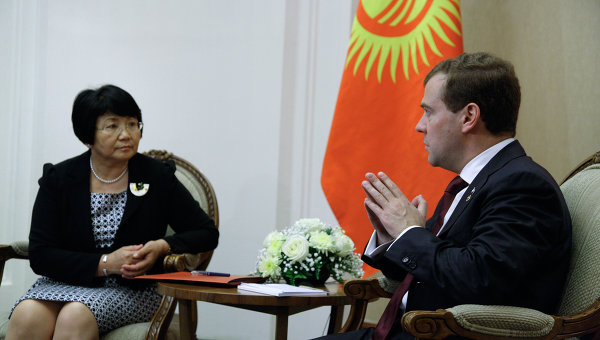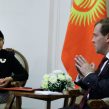
Russia Remains Ambiguous on Kyrgyzstan
Publication: Eurasia Daily Monitor Volume: 7 Issue: 132
By:

Following the violence in southern Kyrgyzstan last month, Russia’s position vis-à-vis its southern neighbor seems indecisive, varying from supportive to obstructive. Shortly after the June 27 constitutional referendum Russian President, Dmitry Medvedev, told journalists that Kyrgyzstan’s experiments with a new constitution are dangerous and might even lead to an “unpleasant collapse of the state” (www.interfax.ru, June 28).
Yet, after the July 5 Eurasian Economic Community (EurAsEC) meeting in Astana, Medvedev posted on his Twitter account: “For us everything that happens in Kyrgyzstan is not something that is happening far away, but [it is] a country that is close to us” (July 5).
Medvedev met with the Kyrgyz President, Roza Otunbayeva, in Astana and further extended his support. “We are not indifferent about the future of the Kyrgyz state and its people. From how the referendum results would impact the events of everyday life, [and] development of political system will of course depend a lot”, Medvedev said (www.kremlin.ru, July 5).
“All this time I felt Russia’s support,” Otunbayeva replied, adding “After a brief meeting with you on May 9 I gained a sense of hope, support, came home inspired and told what you said and how.” Otunbayeva avoided mentioning that her call to send Collective Security Organization Treaty (CSTO) troops to Kyrgyzstan as the human cost increased during the clashes in Osh and Jalalabad was declined by the Russian government (EDM, June 14).
Medvedev has also been unclear as to how he sees US-Russia collaboration in helping to solve Kyrgyzstan’s crisis in the south. The Russian foreign ministry coordinated humanitarian aid to Kyrgyzstan with the US administration. Yet, in his interview on June 21 with The Wall Street Journal, Medvedev mentioned that he prefers to see eventual closure of the US military base in Kyrgyzstan.
Standing out from among regional male leaders, Otunbayeva was congratulated by her fellow EurAsEC participants for becoming president and successfully adopting a new constitution. However, on collective photos taken during the EurAsEC meeting, Otunbayeva has been placed on the far end. Similar to previous meetings between CIS leaders, no pressure was exerted on Belarusian President, Alyaksandr Lukashenka, to extradite the deposed Kyrgyz president Kurmanbek Bakiyev. Instead, Lukashenka was rebuked for other political and economic issues concerning Russia-Belarus relations.
Otunbayeva’s government plans to request that EurAsEC should allocate funds for the stabilization of southern Kyrgyzstan (www.akipress.kg, July 6). Along with Armenia and Tajikistan, the Kyrgyz leader has also expressed interest in joining the Russia-Belarus-Kazakhstan Customs Union, ratified at the July 5 meeting, showing her support for Russian and Kazakhstan policies in the region.
Overall, there are three possible explanations as to why Russia refused to send troops to Kyrgyzstan and for Medvedev’s mixed signals over how he sees the developments in Kyrgyzstan and Russia’s role in assisting the country. First, Russia might not be genuinely interested in stabilizing Kyrgyzstan at the cost of its own troops. At a time of economic uncertainty, the Kremlin’s decision might raise strong domestic opposition. By requesting troops from Russia, Kyrgyzstan has inadvertently displayed its loyalty to Moscow. Russia declining its southern neighbor’s request seemed not to affect Bishkek’s dependence on Moscow.
Alternatively, as some Kyrgyz experts assert, Kyrgyzstan might also present an opportunity for Washington and Moscow to continue “resetting” relations and finding common ground for collaboration. According to this view, both the US and Russia would provide assistance to Kyrgyzstan as long as it corresponds to the interests of the bilateral relationship –sending CSTO troops could impede other aspects of US-Russian collaboration.
Finally, similar to states like Kazakhstan and Uzbekistan where forms of authoritarian leadership still prevail, Russia has no interest in seeing Kyrgyzstan’s new constitution implemented successfully. Indeed, none of the countries can boast about free and fair elections, let alone a strong parliament. If Kyrgyzstan’s experiment with a parliamentary system shows signs of success, its larger neighbors will seem more authoritarian.
Medvedev seems hesitant to commit to any particular political course in regards to Kyrgyzstan. Having a loyal Otunbayeva in place suffices for the time being. However, changes in the past few months have shown that political dynamics in the country can alter rapidly and Kyrgyzstan might need Moscow’s support more than the Kremlin is ready to offer.




